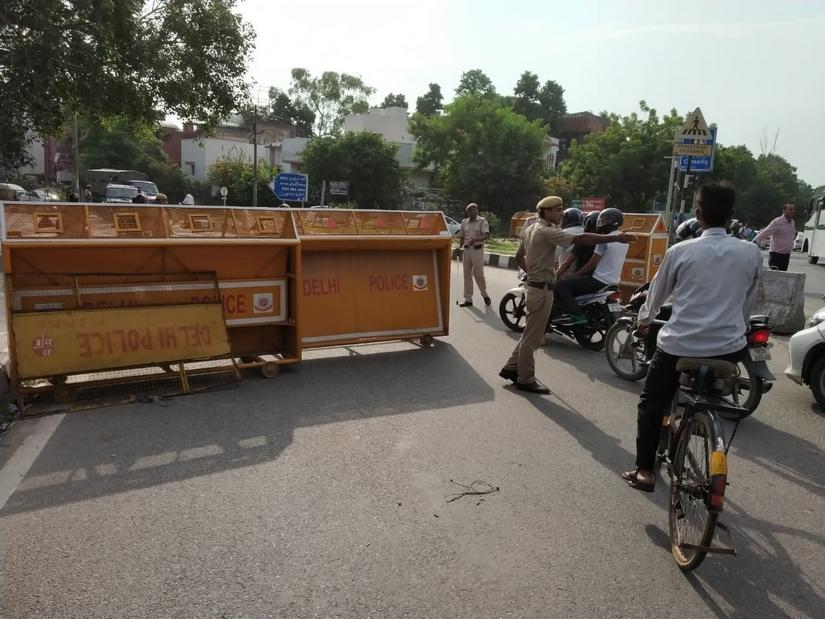DUSU election 2018 LATEST updates: It was raining pamphlets in Delhi University, and quite litterally. Both, NSUI and ABVP supporters were seen throwing pamphlets in air at the campus, while SUVs full of election material were parked outside the varsity. Deepak Chauhan, a third year BSc student at Ramjas College, says that the violence that erupted during Umar Khalid’s event at his college has led to a disenchantment with DUSU politics. Students are more interested in college elections because there’s a connect with the candidate and the issues are more focused. One of the students said that this year the turnout has been very low. He blamed it on the violence created by ABVP last year in Ramjas College and the scuffle reported on Monday in Zakir Hussain college. The ’nationalist ABVP’ has promised to fight for NSS, NCC and Yoga to be introduced as electives, apart from campaigning for a similar fees structure for the same course across colleges. The party also promises to build a wall of heroes, featuring martyrs of the nation. Police could be seen conducting a checki around the North Campus of the Delhi University. The police dispersed the crowd that consisted of people from outside the university**.** Children from nearby slums were being employed near the North Campus to influence voters and distribute pamphlets in exchange of money. They were found distributing NSUI Pamphlets. Condition outside Zakir Hussain College remained tensed, even as polling continued without any disruptions. According to some reports, some NSUI supporters who were not from the university gathered are around the college and started throwing pamphlets. As the news spread, a large number of ABVP supporters also gathered around the college. The candidates said that the mob of outsiders can cause harm and disrupt piece Ramanjot Anand of Moti Lal Nehru College says that strong security measures have been imployed this time to rule out the possibility of foul play in student body polls. Around 700 electronic voting machines (EVMs) have been installed at 52 centres to conduct the polling. Over 100 policemen have been deployed to oversee the election process. The voting has started at the Delhi University and affiliated colleges for the student body polls. The polling will continue until 1.00 pm today, and the counting will take place on 13 September. In this year’s DUSU polls, issues of infrastructure are repeatedly raised — like more hostels, metro passes, 24x7 libraries, subsidised food and laws against caste and gender discrimination in party manifestos. However, several key issues like the non-representation of research scholars in the polling process and women’s representation in the student body, funding and autonomy of university remained missing from the discourse. The elections to the Delhi University Students’ Union (DUSU) are scheduled for Wednesday, with voting set to begin at 8.30 am and will end at 1.00 pm. The votes will be counted on Thursday (13 September) from 8:30 am at the Community Hall in Police Lines in Delhi’s Kingsway Camp area. As many as 1.35 lakh students will decide the fate of 23 candidates in the Delhi University Students’ Union (DUSU) polls on Wednesday. While the National Students’ Union of India (NSUI) has promised the “Institute of Eminence” tag for Delhi University and thalis for Rs 10, the Akhil Bharatiya Vidyarthi Parishad (ABVP) has promised to spend 50 percent of the union’s budget on women and social justice-related activities, along with a special attention to promoting sports and installing sanitary pad vending machines on college campuses. The Aam Aadmi Party’s (AAP) student wing, the Chhatra Yuva Sangharsh Samiti (CYSS), and left-wing students’ outfit All India Students Association (AISA) are jointly contesting the DUSU polls. After the AAP came to power in Delhi in February 2015, its students wing had unsuccessfully contested the DUSU polls. It has promised to ensure installation of CCTV cameras, setting up of police booths on campus, ending the “culture of hooliganism” and opposing commercialisation of education. Around 700 electronic voting machines (EVMs) have been installed in 52 centres. The polling in the morning colleges will commence at 8 am and end at 1 pm, while in evening colleges, it will be held between 3 pm and 7.30 pm. The results will be announced on 13 September. In 2017, the polls saw a 43 percent voter turnout.
DUSU election 2018 updates: Only 5 of 17 women's colleges participate in DU polls; five of 23 candidates female
DUSU election 2018 LIVE updates: It was raining pamphlets in Delhi University, and quite litterally. Both, NSUI and ABVP supporters were seen throwing pamphlets in air at the campus, while SUVs full of election material were parked outside the varsity.
)
Kashmiri student wins for president post in College of Vocational Studies
A Kashmiri student made history in the campus by winning the post of President in College of Vocational Studies, Delhi University. This will definitely boost the morale of other Kashmiri students.
By Harsh Verma
ABVP says turnout declined in few colleges
ABVP media convenor, Monika Chaudhary has stated that voting rate has declined in some colleges of Delhi University like CMC and Miranda house, but on the other hand voting rate was much higher in Law Faculty, which would compensate the whole equation.
Also, we are hoping voting percentage will gain momentum in second half and reasons of low rate vote are still unknown, said Monika Chaudhary.
By Ashish Mani Tiwari/ 101 reporters
Zakir Hussain college saw relatively higher voting turnout
“Voting Percentage of Zakir Hussain Delhi College increased this year because of increased in-take of first year students. Also, girls turned up more than boys”, HOD English Department Abdul Hameed said.
In the shadows of ‘wall of democracy’
Image by Harsh Verma
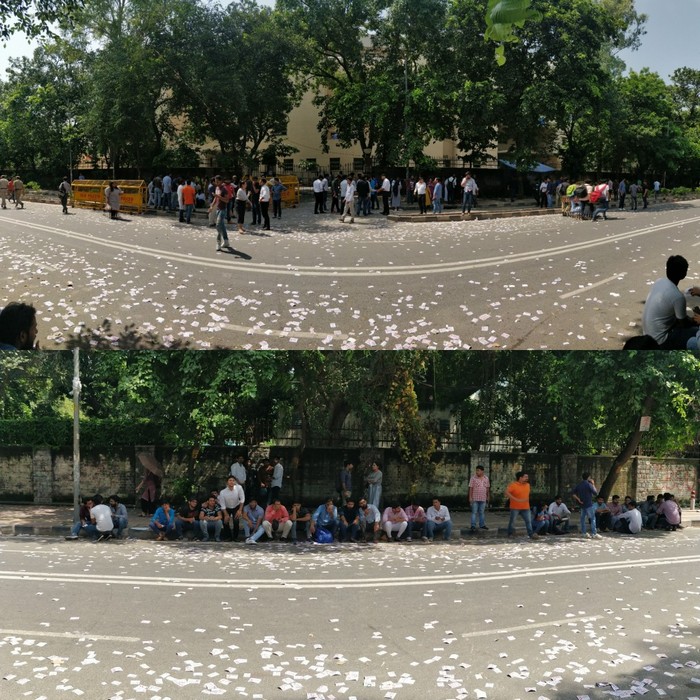
Only 5 of 17 women’s colleges participate in DU polls; five of 23 candidates female
Even as polls in Delhi University are fought on women’s issues — from security on campus to installation of sanitary pad vending machines — the representation of women remains dismal.
Pinjra Tod, a women-oriented student’s group pointed out that hardly 5 of 17 women’s college participate in the Delhi University polls. Besides, this year, only five of 23 candidates this year were female, none contending for the top position.
Voting concludes for morning DU students; second leg of polling to begin at 3 pm
By Rahul Satija, 101Reporters
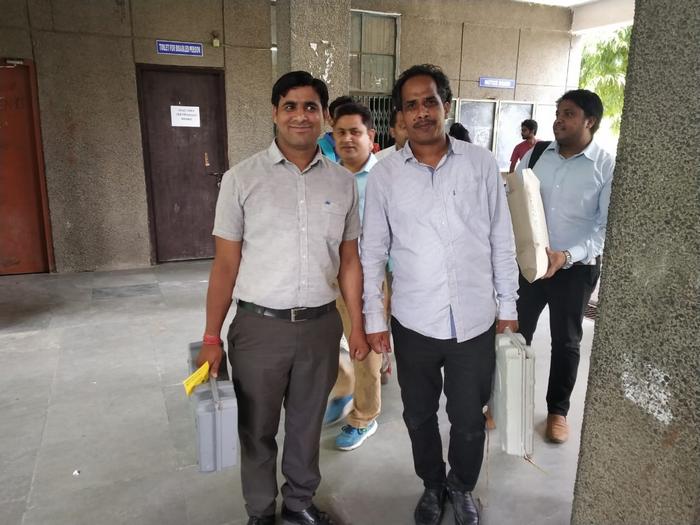
These polls persistent with previous ones in wastage of paper, say students
AISF president says low voter turnout can favour Left parties
All India Students Federation, President, Syed Valiullah Khadri said, low vote rate could favour left unity (AISF and SFI) in DUSU polls, it could be a game changer for major contenders.
Ashish Mani Tiwari/ 101 reporters
ABVP, NSUI workers come face to face in a shouting match at South Campus
Ramjas College students ‘disenchanted’ with varsity polls, say hostility discourage voters
Deepak Chauhan, a third year BSc student at Ramjas College, says that the violence that erupted during Umar Khalid’s event at his college has led to a disenchantment with DUSU politics. Students are more interested in college elections because there’s a connect with the candidate and the issues are more focused.
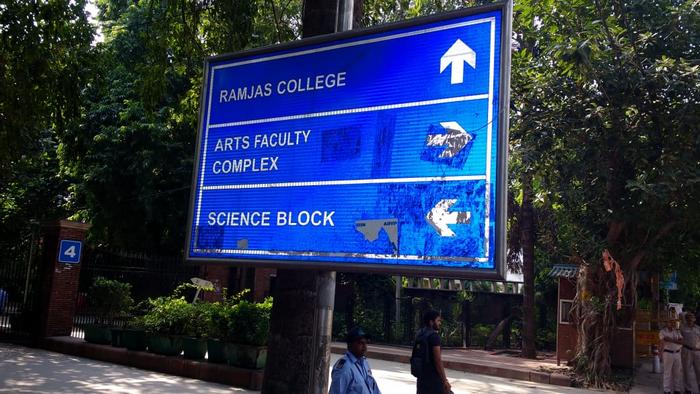
ABVP’s presidential candidate Ankiv Baisova claims Zakir Hussain College violence was NSUI’s ploy
Ankiv Baisoya, presedential candidate for the post of president from ABVP, says he is confident that ABVP will win the elections. He also said that the violence that occurred on Monday was due to the fault of NSUI. “Their supporters stopped ABVP candidates from entering the college due to which violence broke out,” he said.
By Rahul Satija, 101Reporters
ABVP promises to promote sports in Delhi University campus
Candidate alleges bouncers are posted outside colleges to intimidate students
Chandramani Dev, a Law Center-II Second Year student who is contesting for General Secretary post reports an incident at Aditi Mahavidyalay and said such incidents of campus violence create tension and fear among students due to which less students turn up for voting.
Students report low turnout in this year’s DUSU polls
Kunal Ahlawat, who passed out from College of Vocational Studies, said that this year the turnout has been very low. He blamed it on the violence created by ABVP last year in Ramjas College and the scuffle reported on Monday in Zakir Hussain college.
By Rahul Satija, 101Reporters
Additional DCP South West Delhi says DUSU elections are going peacefully
Yoga as elective, wall of heroes, hike in scholarships amid ABVP promises in polls
DUSU polls fought on women’s issues but dismal representation of female students continues
Both NSUI and ABVP were heard canvassing on the issue of women’s security on campus. However, the representation of women in student’s body continues to be low. This time too, out of the 23 candidates, only five are women. Preeti Chauhan of the Indian National Students’ organisation is the only woman nominated for the post of DUSU president this year.
People face traffic snarls around Vishwavidyalaya area
Kriti Kaushik, a former DU student, who had come to college to collect her transcripts has been stuck for hours due to the road block at various places.
By Rahul Satija, 101Reporters
Delhi Police cracks down on outsiders thronging around college, seizes election material from them
Police conducted an inspection around the North Campus of the Delhi University after reports surfaced that outsiders are canvassing for candidates in the student polls. The police dispersed the crowd that consisted of people from outside the university. The and could be seen checking people sitting in parked cars around the campus as well. They also collected pamphlets and election material from these people.
Delhi Police issues advisory against seeking votes in name of caste
The Delhi Police has issued an advisory stating that strict action will be taken against all those who are found influencing voters in an anlawful way. Any appeals made in the name of caste or any gesture that may hurt feelings of any community will be dealt with seriously by law.
Pamphlets for money; supporters of leading parties use ‘slum kids’ in North Campus to influence students
Children from nearby slums were being employed near the North Campus to influence voters and distribute pamphlets in exchange of money. They were found distributing NSUI Pamphlets. When asked to come on camera, the children either refused or demanded money.
Meanwhile, a comic irony in this situation was that one of the children was wearing a ABVP candidate’s t-shirt and distributing NSUI pamphlets and manifestos.
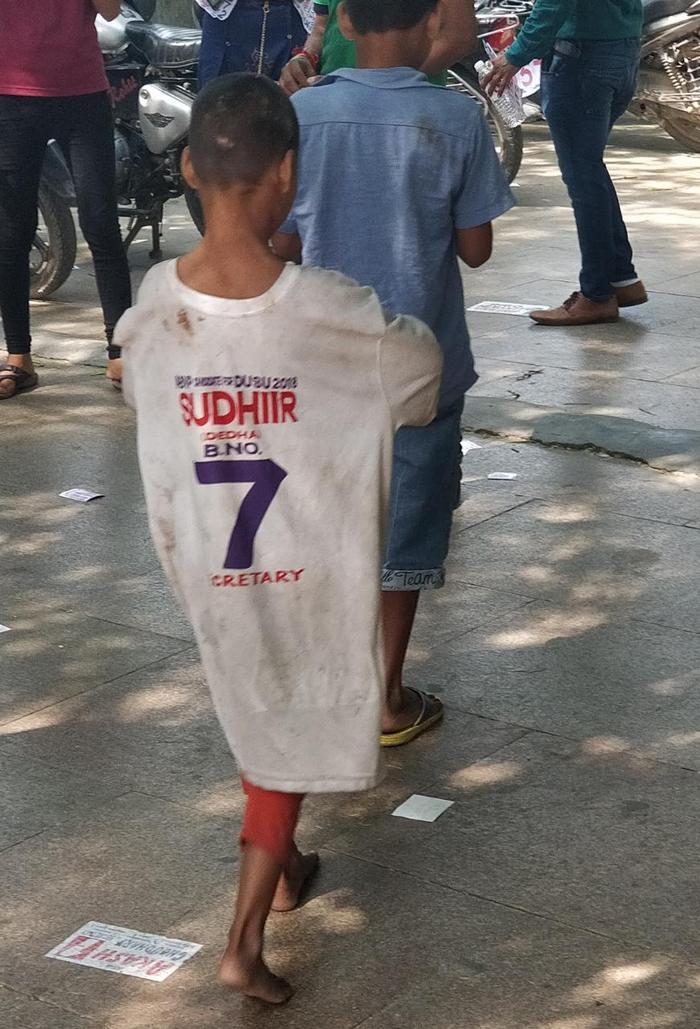
Students queue up outside law faculty to caste vote
The atmosphere remained politically charged in Delhi University as students gathered to choose members of their student councils. With pamphlets strewn all around and political graffiti painted on walls, the elections and the promises made by each of the parties were the dominant topic of discourse.
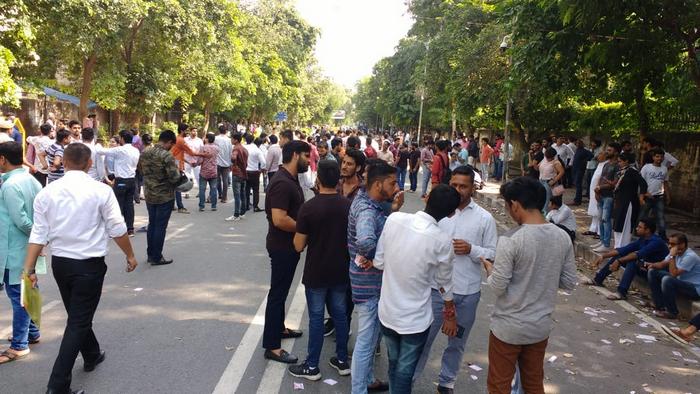
Delhi Youth Congress leader comes in support of NSUI panel
Tasveer Solanki, former vice president Delhi Youth Congress has come in support of NSUI. He condemned the vandalism and violence by ABVP members at te Zakir Hussain College. He said he is confident that NSUI will win the elections. Last year, it was a mixed result for both NSUI and ABVP, with NSUI bagging the posts of president and vice-president, while the ABVP had won the posts of secretary and joint secretary.
By Rahul Satija, 101Reporters
ABVP supporters seen distributing pamphlets outside college
While the official campaigning had ended on Monday, ABVP supporters aboard SUVs were seen scaling the roads outside the Delhi University. They were distributing pamphlets of the ABVP panel.
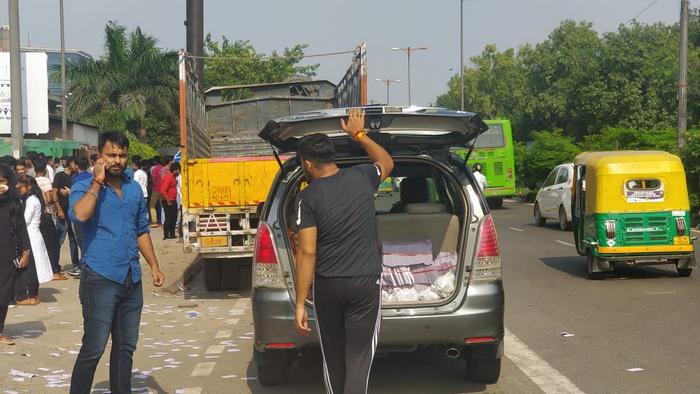
ABVP promised ‘one course one fees’, NSUI speaks of ‘college of eminence tag for DU’
ABVP has promised to fight for ‘same fee for same course’ throughout the university and for increasing the scholarship amount meant for weaker sections, if it wins the Delhi University students polls.
“One Course One Fees: ABVP will make sure that same fee is charged throughout the university for a particular course… we would work for the increment in scholarship for SC/ST/OBC and demand to link the scholarship with price index, in line with increase in DA (Dearness Allowance),” the party promised in its manifesto.
Meanwhile, the NSUI has said that they will fight to get the institute of eminence tag for Delhi University and increased grants for its development.
Women constables deployed outside South Campus
Women constables of the Delhi Police have been deployed outside the South Campus to control any situation that may involve tackling a crowd of female students.
By Rahul Satija, 101Reporters
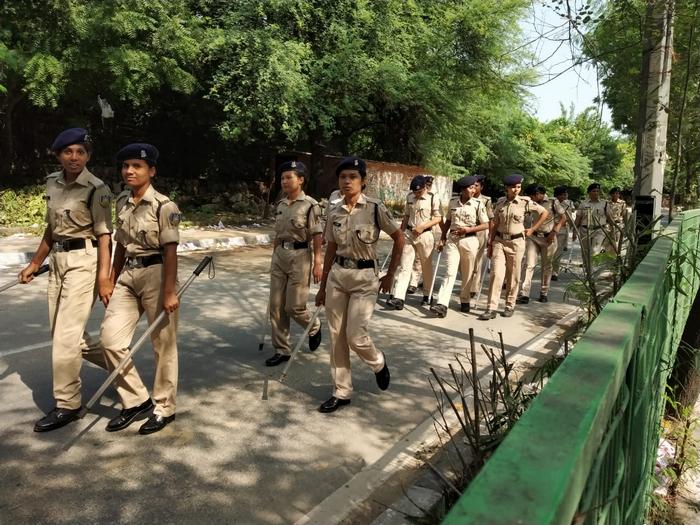
Former BJP MLA Anil Sharma visits varsity to support ABVP
Former BJP MLA from RK Puram, Anil Sharma has come in support of the ABVP panel. He said that he has come to make sure that elections are conducted peacefully and in a fair manner.
Input by Rahul Satija, 101Reporters
Zakir Hussain College remains tense after yesterday’s violence
Condition outside Zakir Hussain College remained tensed, even as polling continued without any disruptions. According to some reports, some NSUI supporters who were not from the university gathered are around the college and started throwing pamphlets. As the news spread, a large number of ABVP supporters also gathered around the college. The candidates said that the mob of outsiders can cause harm and disrupt piece.
Lola Gaidhane of Motilal Nehru College will vote for NSUI, claims ABVP activists indulge in violence on campus
Lola Gaidhane of the Motilal Nehru College would be voting in favour of NSUI. She says the violence that ABVP created last year in North Campus should not happen again. She said that one of her friends was also harassed by the ABVP activists and claims that the outgoing NSUI president and vice-president had worked a lot for the welfare of the students.
Students report discreet use of money, freebies to lure voters
Lola Gaidhane, of the Motilal Nehru College, acknowledges that some of the candidates are handing out freebies and gift coupons to convincevoters. She says a friend her was given a voucher for an amusement park by an independent candidate in order to influence her to vote in favour of him.
By Rahul Satija, 101Reporters
700 EVMs installed to conduct polling
According to _PTI, a_round 700 electronic voting machines (EVMs) have been installed at 52 centres to conduct the polling. Over 100 policemen have been deployed to oversee the election process. The polling in the morning colleges will be held between 8 am and 1 pm, while in evening colleges, it will commence at 3 pm and end at 7.30 pm.
From subsidised food, to promotion of sports, agendas that ruled the DUSU poll campaign this year
While the National Students’ Union of India (NSUI) has promised the “Institute of Eminence” tag for Delhi University and thalis for Rs 10, the Akhil Bharatiya Vidyarthi Parishad (ABVP) has promised to spend 50 per cent of the union’s budget on women and social justice-related activities, along with a special attention to promoting sports and installing sanitary pad vending machines on college campuses.
The Aam Aadmi Party’s (AAP) student wing, the Chhatra Yuva Sangharsh Samiti (CYSS), and left-wing students’ outfit All India Students Association (AISA) are jointly contesting the DUSU polls.
After the AAP came to power in Delhi in February 2015, its students wing had unsuccessfully contested the DUSU polls. It has promised to ensure installation of CCTV cameras, setting up of police booths on campus, ending the “culture of hooliganism” and opposing commercialisation of education.
23 candidates in fray in DUSU polls
As many as 1.35 lakh students will decide the fate of 23 candidates in the Delhi University Students’ Union (DUSU) polls on Wednesday. Five candidates each are in fray for the post of DUSU president, vice-president and joint-secretary, whereas eight candidates are contesting for the post of secretary.
Students say voting process secure, improved
Ramanjot Anand of Moti Lal Nehru College says that strong security measures have been imployed this time to rule out the possibility of foul play in student body polls. First two candidates were called up as witness to confirm that zero votes had been cast, and the witnesses were also made to sign an affidavit to that effect. This move is appreciated by students as it rules out doubts that EVM machines have been altered.
By Rahul Satija, 101Reporters
Watch: A NSUI supporter explains why he voted for Congress-backed party’s panel
Ramanjot Anand of Moti Lal Nehru College says the NSUI has worked for the students in its last tenure. He says that the party has ensured 24×7 access to library in North Campus and has also worked for the safety and security of female students
By Rahul Satija/ 101Reporters
Ballot number of DUSU candidates
Here’s a list of candidates along with their ballot numbers and the post they are contesting for. Students are advised to carry their university ID cards which are to be reproduced before the polling officers, before anyone can caste their votes.
By Rahul Satija, 101 reporters
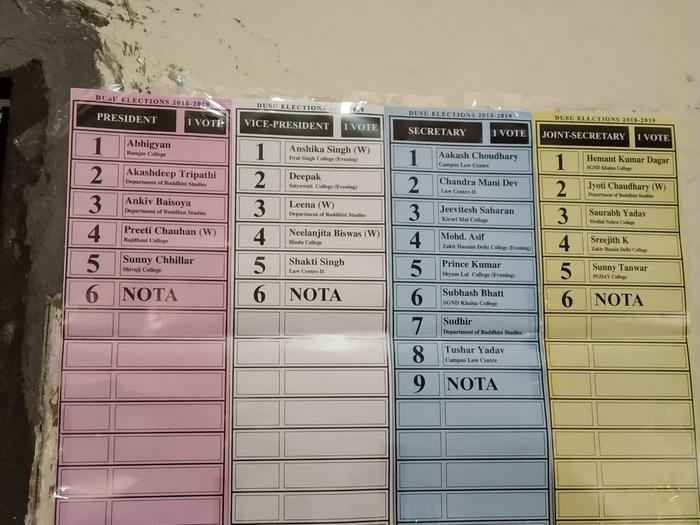
Voting begins at Delhi University campus
The voting has started at the Delhi University and affiliated colleges for the student body polls. The polling will continue until 1.00 pm today, and the counting will take place on 13 September.
Input by Rahul Satija, 101Reporters
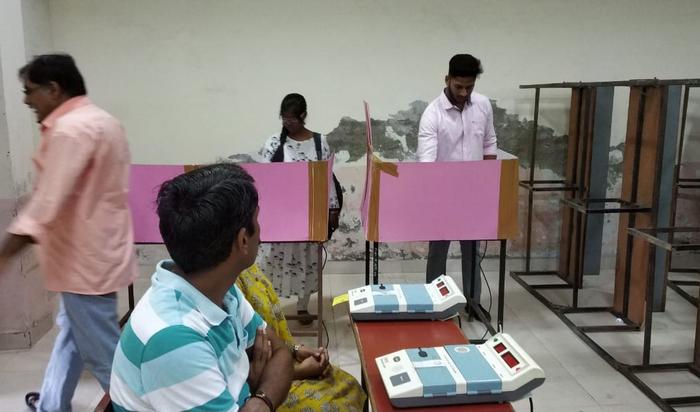
Presidential candidate from Zakir Hussain College speaks on campus violence
Mohd. Saddam, who is a presidential candidate for Zakir Husain Delhi College, student union elections speaks on the violence that broke out on college campus on Monday.
Zakir Hussain College professor Ravi Ranjan, decries violence during DUSU campaigns
The violent incident at Delhi University’s Zakir Husain Post-Graduate Evening College during Delhi University Student Union (DUSU) Election 2018 campaign is unfortunate and should be condemned in all possible ways. This incident has not only caused a good amount of damage to college property but many students including female got injured in college premises and many got terrified, who may rethink about their participation in such collective democratic endeavour.
Police barricades entrances to Delhi University
The Delhi Police have placed barricade at the entrance of the college road. Only students and election officials are being allowed to enter. These arrangements have been made in view of peaceful completion of the polling exercise. On Tuesday, the last day of election campaign, violence had broken out at the Zakir Hussain College in which some female students were also injured.
Input by Rahul Satija, 101 reporter
